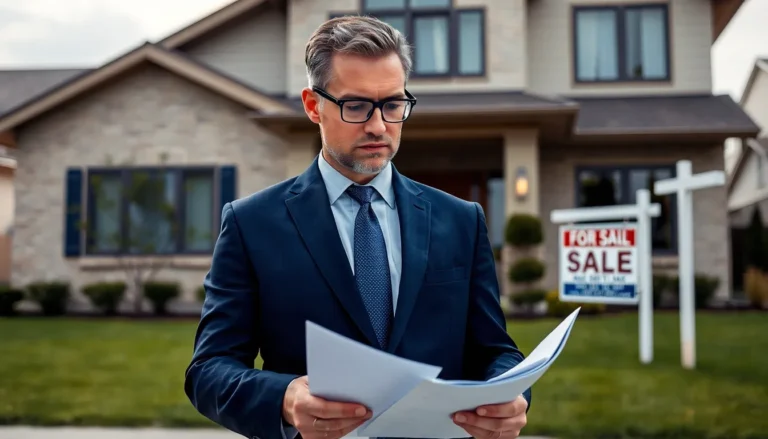Table of Contents
ToggleBeing a landlord can feel like juggling flaming torches while riding a unicycle—challenging yet rewarding. With great power comes great responsibility, and understanding what that entails is crucial for any property owner. From keeping the roof over tenants’ heads to ensuring the plumbing doesn’t turn into a mini Niagara Falls, landlords have a lot on their plate.
Overview of Landlord Responsibilities
Landlords maintain properties to ensure tenant safety and comfort. They handle repairs, ensuring plumbing, electrical, and heating systems function correctly. Addressing maintenance requests promptly is crucial to tenant satisfaction.
Understanding fair housing laws protects landlords and tenants alike. Following these regulations is necessary to prevent discrimination. They also provide proper notice before entering a rental unit, respecting tenants’ privacy.
Landlords ensure the property meets local health and safety standards. This includes conducting regular inspections to identify potential hazards. Keeping common areas clean and well-lit contributes to a safe living environment.
Lease agreements must be clear and enforceable. Landlords outline terms of tenancy, including rental amounts and due dates. Collecting rent on time helps maintain cash flow, so clear communication about payment policies is essential.
Emergency procedures and contact information must be provided to tenants. They should know whom to contact during a crisis, ensuring swift resolutions. Implementing an efficient communication system, such as email or text alerts, improves the process.
Landlords also handle security deposits according to state laws. They collect, manage, and return these funds based on the condition of the property upon move-out. Timely return of deposits fosters trust and encourages good tenant-landlord relationships.
Documentation of all transactions and communications is vital. Keeping accurate records protects landlords from disputes and clarifies responsibilities. Overall, fulfilling these responsibilities builds strong relationships and ensures successful tenancy.
Legal Obligations

Landlords must adhere to various legal obligations to maintain compliance and protect tenant rights. Understanding federal and state laws is crucial for successful property management.
Federal Laws
Federal laws govern several aspects of rental properties. The Fair Housing Act prohibits discrimination based on race, color, religion, sex, national origin, familial status, or disability. It’s essential for landlords to recognize these protected classes and avoid discriminatory practices during tenant selection. Also, the Environmental Protection Agency enforces regulations related to lead-based paint in homes constructed before 1978. Landlords must provide tenants with awareness of lead hazards and meet disclosure requirements. Compliance with these federal regulations reduces the risk of legal disputes and reinforces fair treatment.
State Laws
State laws vary widely, detailing specific landlord responsibilities. These laws often dictate security deposit limits, lease termination procedures, and eviction processes. For instance, some states require landlords to provide a written lease agreement that outlines terms and conditions. Regular property inspections may also be mandated to ensure habitable living conditions. It’s beneficial for landlords to familiarize themselves with local health and safety codes to uphold property standards. Navigating state laws properly fosters positive landlord-tenant relationships and minimizes potential legal conflicts.
Maintenance and Repairs
Landlords must prioritize maintenance and repairs to uphold tenant safety and satisfaction. Responsibilities include ensuring properties meet health and safety standards.
Property Safety
Ensuring property safety requires regular inspections. These inspections help identify potential hazards like gas leaks or electrical issues. Landlords must address safety concerns promptly. Properties should maintain secure entrances and adequate lighting in common areas. Smoke detectors and carbon monoxide detectors require installation in every unit, meeting local code requirements. Additionally, maintaining an environment free from pests contributes significantly to tenant well-being.
Response Times
Timely responses to maintenance requests significantly impact tenant satisfaction. A quick turnaround fosters trust and keeps tenants content. Landlords should establish a clear communication channel for reporting issues, enabling immediate action. Emergencies like plumbing leaks demand rapid attention, typically within 24 hours. For non-urgent repairs, a timeframe of 1 to 3 days remains reasonable. Tracking and documenting all requests enhances responsiveness and accountability, ultimately benefiting the landlord-tenant relationship.
Tenant Rights
Tenants possess specific rights that landlords must respect. These rights ensure a balanced relationship and contribute to tenant satisfaction.
Right to Privacy
Tenants enjoy the right to privacy within their rented units. Landlords cannot enter without proper notice, typically 24 hours in advance. Exceptions include emergencies like water leaks or gas odors, where immediate access is necessary. The rental agreement should clearly state the conditions under which landlords may enter. Respecting this right fosters trust and maintains a positive living environment.
Right to Habitable Living Conditions
Habitable living conditions are essential for tenant well-being. Landlords must ensure that properties comply with health and safety standards. This includes functioning plumbing, adequate heating, and secure entrances. Regular inspections help identify issues before they escalate. Tenants deserve timely repairs, particularly for urgent matters like heating failures in winter. Providing a safe and comfortable home not only meets legal obligations but also enhances tenant satisfaction.
Communication and Management
Effective communication and management between landlords and tenants facilitate a smoother rental experience. Establishing clear expectations is key.
Lease Agreements
Lease agreements must outline all terms of tenancy, including rental amounts, due dates, and responsibilities. Comprehensive agreements protect both parties by providing detailed clauses on maintenance, repairs, and security deposits. Landlords should review the lease with tenants to clarify any questions. Including information on late fees and termination clauses fosters transparency and sets expectations. Signing the lease signifies consent, ensuring tenants understand their obligations in addition to rental terms. Modifications to the agreement may occur, but both landlords and tenants must agree in writing. Clarity in lease agreements minimizes disputes and enhances tenant satisfaction.
Conflict Resolution
Conflict resolution procedures should be in place before issues arise. Landlords must create an environment where tenants feel comfortable voicing concerns. Actively listening to tenant complaints demonstrates respect and a commitment to resolving issues. Following up on reported problems reassures tenants that their concerns matter. When disputes occur, landlords should encourage open dialogue to address misunderstandings. Having written procedures for escalating conflicts, such as mediation or arbitration, can simplify resolution processes. Documentation of all interactions and agreements strengthens accountability and helps avoid legal complications. Fostering a positive environment promotes a harmonious landlord-tenant relationship, leading to long-term satisfaction.
Navigating the responsibilities of being a landlord requires diligence and dedication. By prioritizing tenant safety and comfort through timely maintenance and clear communication, landlords can foster positive relationships that benefit both parties. Understanding and adhering to legal obligations is crucial for protecting tenant rights and ensuring compliance with local regulations.
Landlords who effectively manage their properties while respecting tenant privacy and rights create an environment of trust and satisfaction. This not only enhances tenant retention but also contributes to the overall success of the rental business. A proactive approach to landlord responsibilities ultimately leads to a smoother rental experience and a thriving rental community.








